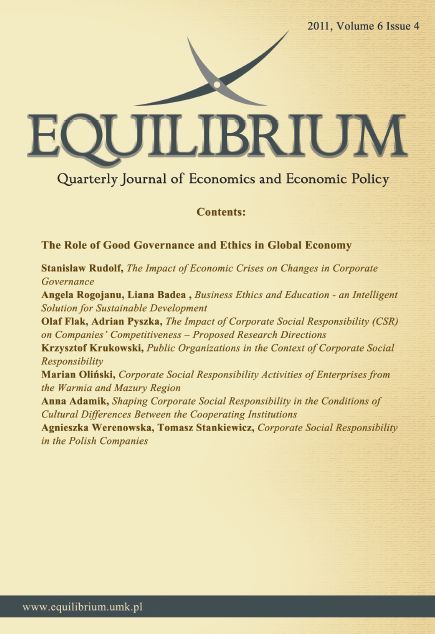Business Ethics and Education ? an Intelligent Solution for a Sustainable Development?
DOI:
https://doi.org/10.12775/EQUIL2011.026Keywords:
moral values, ethics, education, corruptionAbstract
Nowadays, ethics seems to be a very important issue when speaking about the way of doing business. Many economists ask if it is necessary to study the way ethics are transmitted to the next generations of businessmen and if business ethics comes from education. Finally, does it have anything to do with the sustainable development. It is a known fact that there are numerous dimensions of education ? sustainable development linkages. Rapid expansion of education has not necessarily been accompanied by rapid economic growth in many developing countries. There is a series of variables to be taken into account when talking about the connection between education and sustainable development. First, it is very important to realize that the educational system influences the way a country develops. Second, the development of a country also influences the educational system. That is why it is necessary to analyze a bidirectional connection, where identifying the difference between a simple educational system and a functional one is of vital importance. Starting from such aspects, this paper aims to emphasize the connection existing between the three concepts: education-business ethics-sustainable development. Using qualitative methods and also statistics, this paper offers an analysis of the way ethics and education influence the development of economy.
Downloads
References
Brady F. N. (1990), Ethical managing: Rules and results, MacMillan, New York, USA
De George R.T. (1999), Business Ethics, 5th edition, Prentice Hall, New Jersey, USA
Gilbert J.T.(1992), Teaching Business Ethics: What, Why, Who, Where, and When, ?Journal of Education for Business?, Vol. 68, No. 1, pp. 5-9, available at http://dx.doi.org/10.1080/08832323.1992.10117578 (date of access: February 2011)
Gini A. and Marcoux A.M. (2009), Case Studies in Business Ethics, 6th edition, Prentice Hall, New Jersey, USA
Hirschman, A. O. (1999), Exit, voice and Loyalty, Nemira Press, Bucharest, Romania
Issa T. and Pick D. (2010), Is Business Ethics worth teaching? An Australian higher education experience, The 14th Annual European Business Ethics Network (UK) Conference Volume, London ? Ethics in Crisis: a call for alternatives, School of Business and Management Queen Mary, University of London, UK
Jickling, B. (1992). Why I don't want my children to be educated for sustainable development, ?Journal of Environmental Education?, 23( 4), pp. 5-8.
Kish-Gephart J.J, Harrison D.A. and Trevino L.K. (2010), Bad apples, bad cases, and bad barrels: meta-analytic evidence about sources of unethical decisions at work, ?Journal of Applied Psychology?, Vol.95, No.1, pp.1-31
Legatum Institute (2010), The Legatum Prosperity Index Report. 2010, London, UK. Available at www.prosperity.com (date of access: February 2011)
Merton R. (1965), Elements de Theorie et de methode sociologique, Paris, France
Rogojanu A. (2007), The Moral Principles and Business Environment, International Symposium ?Communication, Competence, Competitiveness?, Academy of Economic Studies Publishing House, Bucharest, Romania
Transparency International Romania (2010), 10 years of ART in Integrity, Romania. The National Integrity System, Bucharest, Romania
Transparency International (2010), Global Corruption Barometer 2010, www.transparency.org (date of access: January 2011)
Trevino L.K. and Nelson K.A. (2007), Managing Business Ethics, John Wiley & Sons Co., New Jersey, USA
United Nations Educational, Scientific, and Cultural Organization (UNESCO). (1992), Refonte de l'éducation pour un développement durable - Reshaping education for sustainable development), Dossiers Environnement et Développement, Paris: UNESCO.
Weber J. (1990), Measuring the impact of teaching ethics to future managers: A review, assessment, and recommendations, ?Journal of Business Ethics?, Vol. 8, pp. 183-190.
World Economic Forum (WEF) (2010), The Global Competitiveness Index 2010?2011, Geneva, Switzerland
http://www.hr-romania.ro/(date of access: March 2011)
*** (2009), ?Report by the Commission on the Measurement of Economic Performance and Social Progress?
*** (2011), ?Monitoring Economic Performance, Quality of Life and Sustainability?, Joint Report as requested by the Franco-German Ministerial Council, German Council of Economic and Conseil d?Analyse Économique






